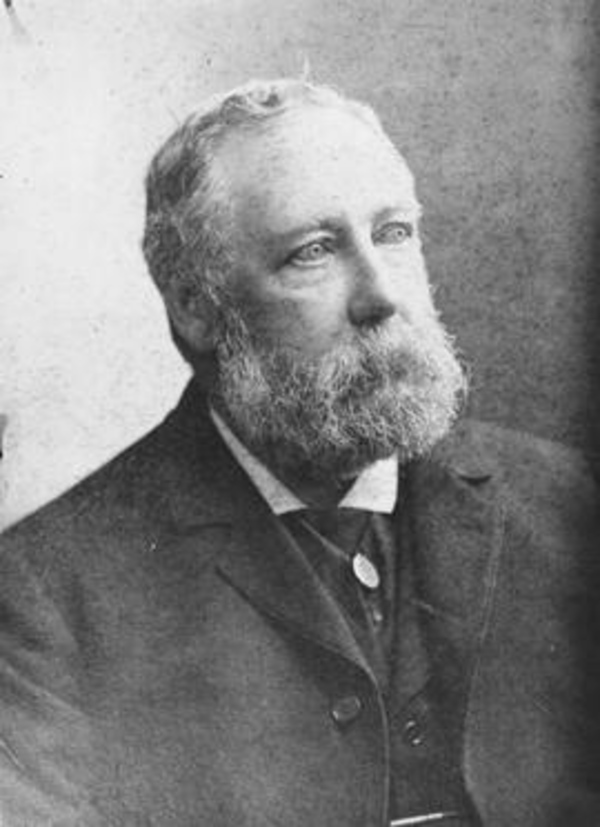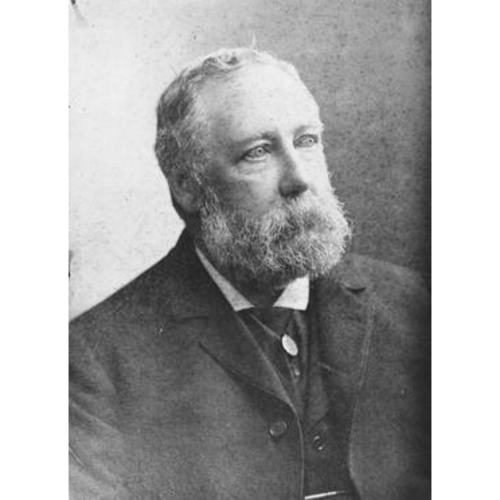
Source: Link
EDMONDS, HENRY VALENTINE, businessman, office holder, militia officer, notary, jp, and politician; b. 14 Feb. 1837 in Dublin, son of William Edmonds and Matilda Humphries; m. 27 Nov. 1867 Jane Fortune Kemp of Cork (Republic of Ireland) in Sapperton (New Westminster), B.C., and they had three sons and two daughters; d. 14 June 1897 in Vancouver.
Born into an Anglo-Irish family, Henry Valentine Edmonds moved from Dublin to Liverpool at the age of 12. He later attended schools in Germany and spent a short period in the British army before immigrating in April 1862 to British Columbia. Soon after his arrival he was engaged in a characteristic mix of small-scale business activities in New Westminster.
Edmonds first achieved prominence, however, as an office holder. Appointed deputy sheriff in 1867, he would receive after confederation a string of government posts in New Westminster city and district, the latter extending eastward through the lower Fraser valley to Hope. In June 1872 he was named notary public, and over the next two years he acquired positions as returning officer, sheriff, district registrar of births, deaths, and marriages, assistant land commissioner, and gold commissioner. He lost all but the position of sheriff after the government of Premier George Anthony Walkem* vacated office in 1876: his loss of the shrievalty four years later was also, he claimed, “wholly due to political purposes.” Thereafter Edmonds advertised himself as being fully acquainted with provincial administration on the mainland, especially with the “Land Business.” He was named justice of the peace for New Westminster District in July 1883.
A land speculator, Edmonds accumulated real estate in Port Moody, the Mount Pleasant area of Vancouver, Burnaby, and Lulu Island, as well as in his home town of New Westminster. In the early 1880s his attention centred on Port Moody, which a contingent of New Westminster land speculators hoped would be the location of the Canadian Pacific Railway’s western terminus. Edmonds’s property south of False Creek took on new value after Vancouver’s incorporation as a city in 1886 [see Malcolm Alexander MacLean].
Aggressive promotion of real estate around New Westminster ultimately proved Edmonds’s undoing. From 1889 he invested in three street railway companies, the most important of which was the Westminster and Vancouver Tramway Company, formed in 1891 by several local businessmen, including Mayor David Oppenheimer of Vancouver. Crossing Mount Pleasant and Burnaby, the interurban line, completed that September, was clearly intended to increase the value of Edmonds’s suburban lands. But, hampered by steep grades, low population density, and a crippling downturn in the real estate market in the area served by the tramway, the company defaulted on its loans in May 1893. Claims worth more than $100,000 were registered against Edmonds that spring in the Supreme Court of British Columbia. The British Columbia Gazette of 6 Dec. 1894 gave notice of sale of a large number of Edmonds’s urban and suburban lots to satisfy creditors’ claims. He thus gradually lost the wealth accumulated during more than 30 years as an active New Westminster entrepreneur. By 1897 he was living in Vancouver with his son, and at his death left real property worth only $1,000 and personal property of $100.
More constant than his business fortunes was Edmonds’s community leadership. An enthusiastic civic booster, between 1872 and 1883 he promoted a rail link from the Fraser River to the United States, joined a number of “influential citizens and merchants” in an unsuccessful attempt to establish a sugar-beet industry in New Westminster, and became secretary of the board of trade at its formation in 1883 . He served as an officer of both the Hyack Fire Company No. 1 (1871) and of the local militia (1870–75), organized the mechanics’ institute (1865), was an actor with the Amateur Dramatic Club (1877), and chaired commissions of the Royal Columbian Hospital and the Provincial Asylum for the Insane (1884).
His boosterism also found political expression. He had been vocal in supporting New Westminster’s claim to remain the seat of colonial government [see John Robson]. In early 1870, having joined with other civic leaders in urging that the colony enter confederation and that clauses in Governor Anthony Musgrave*’s terms of entry which favoured Vancouver Island be deleted or altered, he was appointed to a committee of prominent New Westminsterites charged with examining the terms. He also filled the politically important post of clerk of the municipal council from 1867 to 1872. An alderman for several months in 1882 and mayor for part of 1883, he left both offices in mid term, the latter mysteriously after losing a council vote. During his unsuccessful campaign for a seat in the provincial legislature in 1884, he continued to stress local issues, arguing that New Westminster’s representation should be increased so that “we may be on at least an equal footing with the island when it comes to voting on mainland interests.” His prominence as a public figure waned in the 1880s.
Edmonds’s historical significance rests not with his chequered business and political careers but with the representative nature of his economic role and local outlook. Edmonds Street and the Edmonds rapid transit station in Burnaby are reminders that he was influential mainly as a suburban land promoter.
City of New Westminster, B.C., Council minutes, 1882–83. City of Vancouver Arch., Add. mss 54 (J. S. Matthews coll.), file E-35; Map Coll., nos.39, 108, 531; Newspaper clipping files, nos.2744 (H. V. Edmonds), 7549 (Page Powell). PABC, GR. 1422, 1897/401. Univ. of B.C. Library, Special Coll. (Vancouver), M75 (British Columbia Electric Railway Company Ltd., records), AXB 5-1 (Vancouver Street Railway Company, minute-books, November 1888–March 1894). British Columbia Gazette (New Westminster; Victoria), 1863–97. British Columbian, 24 Dec. 1862; 9 May, 10 June 1867; 13 Nov. 1867–February 1868; April–November 1882; 1883–84. Daily News-Advertiser (Vancouver), 12–15 June 1897. Mainland Guardian (New Westminster), 16 Nov. 1867; 1870–71; 6 Feb. 1873; 28 Jan. 1875; 14 June 1876; 14 Dec. 1878; 2 April, 31 May, 18 June 1879; April–November 1882; 1883–84. Vancouver Daily World, 12–14 June 1897. B.C. directory, 1882–83: xxxi, 201–9; 1892: 906, 1002, 1013, 1036, 1108–9. Kerr, Biog. dict. of British Columbians. Martin Robin, The rush for spoils: the company province, 1871–1933 (Toronto, 1972). E. O. S. Scholefield and F. W. Howay, British Columbia from the earliest times to the present (4v., Vancouver, 1914), 3: 72–76. George Green, “Some pioneers of light and power,” BCHQ, 2 (1938): 153–58.
Cite This Article
Robert A. J. McDonald, “EDMONDS, HENRY VALENTINE,” in Dictionary of Canadian Biography, vol. 12, University of Toronto/Université Laval, 2003–, accessed April 28, 2025, https://www.biographi.ca/en/bio/edmonds_henry_valentine_12E.html.
The citation above shows the format for footnotes and endnotes according to the Chicago manual of style (16th edition). Information to be used in other citation formats:
| Permalink: | https://www.biographi.ca/en/bio/edmonds_henry_valentine_12E.html |
| Author of Article: | Robert A. J. McDonald |
| Title of Article: | EDMONDS, HENRY VALENTINE |
| Publication Name: | Dictionary of Canadian Biography, vol. 12 |
| Publisher: | University of Toronto/Université Laval |
| Year of revision: | 1990 |
| Access Date: | April 28, 2025 |



